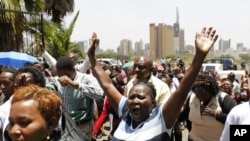Hospitals in Kenya are turning away patients due to an ongoing strike by the country's health professionals. The government announced it was firing many of the strikers Thursday, a decision that may only prolong the hardship for those in need of care.
A day after the Kenyan government announced it was cutting 25,000 health workers from its payrolls, the Mbagathi Hospital in Kenya's capital Nairobi was quiet - maybe a little too quiet.
"The fact that we are seeing few patients is very bad," said Dr. Andrew Suleh, the superintendent of Mbagathi Hospital, a public facility which typically serves low-income patients, including those from the nearby Kibera slum.
He says the 200-bed hospital usually sees 1,000 patients a day. Now, it is only seeing 50 to 100 and has stopped admitting patients except for six people who were abandoned there by their families.
But it is not that people simply stopped getting sick, so Dr. Suleh says he can only assume the worst.
"They can't afford going to private facilities, so one can only conclude that they could be suffering at home and even dying at home," said Suleh.
Health workers' revendications
Nurses and other health workers at Mbagathi and other regional hospitals stopped work last week to call for better wages and working conditions. But the government has not budged, and, instead, announced Thursday that the striking workers would be sacked.
Dolly, a nurse at Mbagathi hospital, did not strike, because she was not directly hired by the government.
But, she says, without specialists or the capacity for in-patient care at the hospital, she is forced every day to turn away patients.
"It has really brought some impact because most of the patients are not being seen now. Like the ones that are seriously sick - the only ones we can attend to are the ones who are stable," she said.
Impact on patients
The Kenyan media has reported cases of mothers who have died in childbirth outside Kenyan hospitals because no nurses would attend to them and other horror stories. One newspaper published a front-page picture of a man who had fallen out of his hospital bed and was left on the floor for hours.
But the overwhelming sensation at Kenya's understaffed hospitals is an eerie calm.
For those patients who do not require a lot of attention, the situation is actually an improvement.
Simon Gidhua, a patient at Mbagathi, did not say what he was there for, but he was in and out within 10 minutes.
"So the situation is not so bad, but there are patients - you can say they are minimal, there are very few - but the doctors who are available, they are attending patients very nicely, especially the one who saw me," he said. "Me, I've had no problem, yes, even I was surprised because I was expecting to stay here for so many hours."
Some ignored strike
The patients who cannot be treated at Mbagathi and other regional hospitals are being referred to Kenyatta National Hospital, where nurses ignored the strike call.
Here, the scene is very different. The hallways are packed with visitors and doctors shuffling between wards. All the rooms appear full, and patients wait on gurneys in the hallways outside the X-ray room.
But apparently that is nothing new. A hospital official, who declined to be recorded, told VOA that this is the biggest referral hospital in sub-Saharan Africa and that it is always at capacity.
Kenyatta National is coping with the extra patients, for now, but it too is understaffed.
The hospital currently employs about 1,600 hundred nurses, and for those who are recently out of work, they are looking to hire 60 more.
Kenya's medical union leaders say the mass layoffs are not the end of the matter, and that they will continue the strike until their demands are met.







